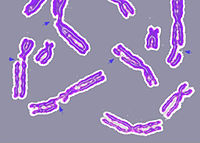
Photo from wikipedia
Inducing DNA damage is known to be one of the mechanisms of cytotoxic chemotherapy agents for cancer such as cisplatin. The endogenous DNA damage response confers chemoresistance to these agents… Click to show full abstract
Inducing DNA damage is known to be one of the mechanisms of cytotoxic chemotherapy agents for cancer such as cisplatin. The endogenous DNA damage response confers chemoresistance to these agents by repairing DNA damage. The initiation and transduction of the DNA damage response (DDR) signaling pathway, which is dependent on the activation of ATM (ataxia-telangiectasia mutated) and ATR (ataxia telangiectasia and Rad3-related), is essential for DNA damage repair, the maintenance of genomic stability and cell survival. Therefore, ATM or ATR inhibition is considered as a promising strategy for sensitizing cancer cells to chemotherapy. This study is aimed to explore the effect of ATR inhibitor on sensitizing ESCC (esophageal squamous cell carcinoma) cells to cisplatin, and whether ATM deficiency could impact the sensitization. We found that 21.5% of ESCC cases had ATM deficiency and that patients with ATR activation after neoadjuvant chemotherapy had worse chemotherapy response and poorer overall survival than that without ATR activation (32 mons vs. >140mons). Then, it was shown that VE-822 inhibited ATR-CHK1 pathway activation, leading to the accumulation of cisplatin-modified DNA. And it inhibited cell proliferation, induced cell cycle arrest in G1 phase and enhanced cell apoptosis. Moreover, VE-822 significantly sensitized ESCC cells to cisplatin, and these two drugs had synergistic effects, especially in ATM-deficient cells, in vitro and in vivo. Our results suggest that ATR inhibition combining with cisplatin is a new strategy for managing patients with ESCC, especially those with ATM-deficiency. However, this is an idea that requires further validation.
Journal Title: Cancer letters
Year Published: 2018
Link to full text (if available)
Share on Social Media: Sign Up to like & get
recommendations!